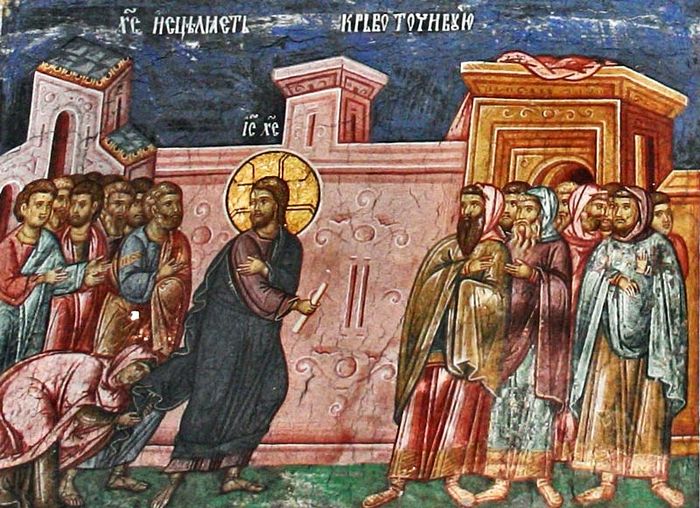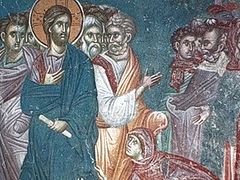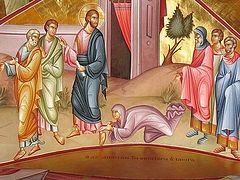“Who touched Me?”
Today, in our society the question implies sexual overtones and misconduct accusations. Not long ago there were clear lines about what was “proper” touch, even in dancing. But as our social mores continue to change, lines can become both blurred and sharp. There is still good touch in our society, people do know how to be tender and affectionate with one another. There are medical massage people and nurses who understand the importance of touch in healing, as do many compassionate human beings. But it is true that our current generation is “wrestling” with what constitutes good and proper touch, and numerous celebrities have felt the sting of improper touch, whether as victims of it or the perps.
Our modern sensitivities about touch, a necessary society-wide examination of our behaviors, values and morality, do not enter into the picture presented to us in the Luke 8:41-56. There is a lot of touch going on in the narrative, but the lesson is focused on one tiny touch which though inappropriate by the standards of that society was neither sexual nor evil.
In the Gospel lesson, Jesus is being jostled by a crowd and then suddenly stops and asks:
“Who touched Me?”
Each person in the crowd is shouldering his or her way in the throng, trying to get close to Jesus. Elbowing and butting their way to be right next to Christ, to get a hand on Him. The text implies they are crushing Him. And, when Jesus asks “Who touched me?“, quite humanly everybody who is pushing and shoving to get next to Jesus immediately denies that they touched Jesus! “Wasn’t me!” could be heard all around. Peter sees the absurdity of the situation (perhaps is even nervously embarrassed for the Lord for asking the question) and points out the obvious – every single person there is pressing on Him. “We are all squashing you and sticking to you, sorry. Are you being facetious in asking who touched you?”
Jesus, however, is not asking who was jostling Him or elbowing Him or banging into Him or grabbing Him. He particularly wants to know who gracefully touched Him in faith? Who, in other words, has the divine touch? Jesus knows the difference between being poked and prodded on the one hand, or, on the other hand, touchingly making a human connection – a holy touch. {And many of us know what it is to be truly touched by what someone else does for us}. Jesus recognizes the difference between an accidental touch and one done with the intention of making a human connection. Jesus tells this person that her faith healed her – Jesus felt her faith. Interesting because with everyone else bumping into Him and pushing against Him, what he feels is the one who touches the hem of His garment, but not His body. He doesn’t claim He healed her, He really is saying it was her touch which brought healing into her life. This women neither bumped into Him unintentionally as part of the crowd’s pushing and shoving nor grabbed Him or grasped onto Him to get Him to pay attention to her. Jesus could feel that difference – He felt Her faith in Him and His power flowing into Her.
The 3rd Century theologian and biblical scholar Origen insightfully comments that it is this woman who has the divine touch:
The outer human being has the sensible faculty of touch, and the inner human being also has touch, that touch with which the woman with a hemorrhage touched the hem of Jesus’ garment (cf. Mark 5.25-34 parr). She touched it, as He testified who said: Who touched me? (Mark 5.30). Yet just before, Peter said to Him: The multitudes are pressing upon you and you ask, ‘Who touched me?’ (Luke 9.45 parr). Peter thinks that those touching are touching in a bodily, not spiritual manner. Thus, those pressing in on Jesus were not touching Him, for they were not touching Him in faith. Only the woman, having a certain divine touch, touched Jesus and by this was healed. And because she touched Him with a divine touch, this caused power to go forth from Jesus in response to her holy touch. Hence He says: Someone touched me: for I perceive that power has gone forth from me (Luke 8.46). It is about this healing touch that John says: Which we have touched with our hands concerning the word of life (1 John 1.1). (Treaty on the Passover, p. 72)
It is spiritually possible to be in the crowd pressing against Jesus and not be touched by Him, nor for Him to be touched by you. If we want our Lord to be touched by our prayer, we need to learn from this woman how to approach Christ- not grasping Him so that He must pay attention to you, nor unintentionally bumping into Him by mindless, scattered prayer, but rather by complete, self-effacing humility and focused faith. Seeking to touch Him as your Lord not as your servant in order to be healed by Him, not to prove one’s worthiness or to be able to boast of one’s blessings, but rather in recognition of His being Lord, God and Savior. The woman didn’t seek to make Christ her servant, she didn’t try to alter or interrupt His mission. She did not see herself as worthy of His attention. She faithfully wanted His healing holiness to flow into her life without bothering Him at all. She doesn’t grab a hold of Jesus, no graspingness in her at all, but in touching His garment she connects with Jesus. This woman’s touch creates a union, communion, with the incarnate God. That is what we seek in prayer. It is what we should be seeking when we receive Holy Communion – connection with Jesus Christ our Lord.
For the woman with the hemorrhage, she would not even be able later to boast about what happened to her, for her very presence in the crowd was religiously immoral and anti-social, disrespecting everyone around her. She would have found herself even more shunned by angry neighbors if she told them what she did – they would see her as defiling Jesus, not being healed by Him. What she was hoping would happen to her was something nobody would believe later if she told them. They would not believe that God would heal a person in the moment she is violating the Law and contaminating everyone around her with her uncleanness. She didn’t belong there bodily by rule and ritual. So amazingly, she could be there only spiritually by faith, hope and love. It was her spiritual presence that was holy and connected her to Christ. If we want Christ to hear our prayer – to be touched by our prayer – we have to make ourselves fully spiritually present to Him. Not just bodily present – but fully present in soul and spirit, heart and mind. And this union with Christ and this prayer can be offered anywhere at any time even when it otherwise seems inappropriate. We can always be seeking Christ even in a crowd, even when in a hostile situation, even when we are someone who is unwanted by all those around us.
She came to touch God but discovered that she had the divine touch! It was her inner self and disposition which had allowed God to enter into her life and open her to the healing grace of Christ. The divine power in Christ was at home in her, so readily flowed from Him to her. Unlike the chosen Apostles, she didn’t seek to sit at the right hand of Christ in order to rule others. She was content to receive Him into her life, but He pointed her out as a model of faith, capable of receiving divine peace.
Jesus said to her, “Daughter, be of good cheer; your faith has made you well. Go in peace.”
There is also an entire Scriptural background to this narrative. In Leviticus 15 we are given the commandments concerning a woman with a flow of blood whether normal menstruation or due to some medical condition. In part the Law reads:
“When a woman has a discharge of blood which is her regular discharge from her body, she shall be in her impurity for seven days, and whoever touches her shall be unclean until the evening. . . . If a woman has a discharge of blood for many days, not at the time of her impurity, or if she has a discharge beyond the time of her impurity, all the days of the discharge she shall continue in uncleanness; as in the days of her impurity, she shall be unclean. . . . But if she is cleansed of her discharge, she shall count for herself seven days, and after that she shall be clean. And on the eighth day she shall take two turtledoves or two young pigeons, and bring them to the priest, to the door of the tent of meeting. And the priest shall offer one for a sin offering and the other for a burnt offering; and the priest shall make atonement for her before the LORD for her unclean discharge. Thus you shall keep the people of Israel separate from their uncleanness, lest they die in their uncleanness by defiling my tabernacle that is in their midst.” (Leviticus 15:19-31)
Anyone who touches a woman with a flow of blood is made unclean by that contact. But what happens if someone unclean touches something that is holy? This menstruating and thus, at least by the religious standards of that day, ritually unclean woman wants to touch Christ in order to be healed. She has a faith which goes way beyond what the Scriptural Law dictates. No one is to touch her, but what happens if she touches someone? The Prophet Haggai offers this (Haggai 2:11-13) :
“Thus says the LORD of hosts: Ask the priests to decide this question, ‘If one carries holy flesh in the skirt of his garment, and touches with his skirt bread, or pottage, or wine, or oil, or any kind of food, does it become holy?'” The priests answered, “No.” Then said Haggai, “If one who is unclean by contact with a dead body touches any of these, does it become unclean?” The priests answered, “It does become unclean.”
Holiness and uncleanness seem to flow in one direction – if you touch the garment which has holy flesh in it, does the holiness flow into you so that you become holy? The priests answer: NO, holiness does not flow in that direction. However, uncleanness does flow from a defiled object to the thing the unclean touches.
Interestingly enough in the Gospel lesson we see something new transpiring. The need for the Law is changing. Something greater than the Law is now present in Israel. The women’s uncleanness does not spread to Christ or to the crowd. But Christ’s holy power does flow to the unclean women. Something new and holy is present in Christ. What the priest’s in Haggai’s day thought impossible has come to pass. Christ is not made unclean by the touch of the menstruating woman, but that woman is made whole and holy by touching Christ, the incarnate God. Christ as the new High Priest of the new revelation shows the emptiness of the Levitical priesthood. The Levitical priests were powerless to bring holiness to others. Christ reveals His power in that He makes all things Holy. [This entire Gospel lesson also tells us it is proper for menstruating woman in faith to receive Holy Communion.]
The Levitical Law made it clear that there is a need to keep the unclean separate from the rest of Israel because uncleanness present in the midst of the people will make the tabernacle in their midst itself unclean.
Thus you shall keep the people of Israel separate from their uncleanness, lest they die in their uncleanness by defiling my tabernacle that is in their midst.” (Leviticus 15:31)
But when Christ is in their midst, tabernacling with them, He is not made unclean by contact with the woman, but rather holiness flows from Him into the woman and heals her. The tabernacle is no longer defiled by the uncleanness or sin of the people, but rather God’s holiness is now flowing from the incarnate Christ into the lives of the people and even the unclean are being restored to Israel.
In Genesis 3:3, Eve expressed a thought that even if they were to touch the Tree of Good and Evil, they would die. Holiness is taboo and deadly to the touch. She apparently did not believe creation was a means to experience and know God. The Woman with the flow of blood on the other hand believed in the life-giving nature of God, even God in the flesh. The Law of her day also opposed her touching Jesus or any human. But this time, the woman’s touch is divine and holy for it connects her to God rather than separating her from God. Christ has not only opened Paradise to us, for in the incarnation He made it possible for us to touch God.





